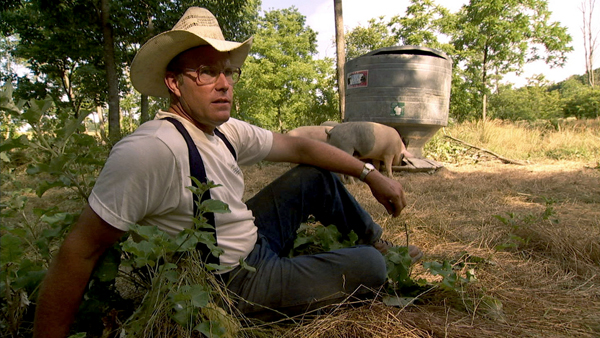|
Reviews of Recent Independent, Foreign, & Documentary Films in Theaters and DVD/Home Video

FOOD, INC. What Upton Sinclair didn’t realize is that even the harshest exposé could benefit from a light touch. Director Robert Kenner’s Food Inc. rips into the perversely commercialized food industry with a jagged, investigative tooth, but manages to deliver the frightening and repulsive massage with a hearty dose of goodwill and playful graphics. The charming (and charmingly bald) expert duo headlining the film—authors Eric Schlosser (Fast Food Nation) and Michael Pollan (The Omnivore's Dilemma and In Defence of Food: An Eater's Manifesto)—have at least something to do with the digestibility of the topic. They aptly guide the audience through a litany of disturbing revelations about the food they ate that very day without any unsavoury Michael Moore-like gimmicks or alarmism. Cheap documentary stunts aside, the authors and the entire panel of advocates, farmers, and officials interviewed effectively manage to churn stomachs and, hopefully, turn minds. They pull back the curtain on a shockingly centralized industry—only a handful of corporations control the majority of America’s food production—and accuse the bloated companies of placing riches and domination above social, environmental, and consumer health concerns (surprise, surprise). Raw ingredients—among which the freakishly ubiquitous corn reigns supreme—are genetically modified, chemically sterilized (that chicken had a refreshing ammonia bath before making it to your supermarket), and increasingly altered from their natural form. While the full impact of some of these measures is unclear (leaving us waiting for statistical certainty while cancer rates skyrocket around us), some consequences of mechanizing food production cannot be denied. The gargantuan scale of processing plants and the wretched state of the “product” directly lead to frequent and potentially deadly E. coli outbreaks caused by fecal material in the meat. If the companies don’t care about occasional fatalities from these mishaps, they certainly don’t worry about the rising rates of obesity and diabetes directly attributable to the affordability of food high in additives, calories, and sugar. What should give us pause is that these foods aren’t actually cheaper to make. Bloated government subsidies force farmers to overproduce corn, thereby devaluing the main ingredient for a shockingly high proportion of our daily foods—from odd sounding additives like xanthan gum to the piece of steak from a cow fed an all-corn diet.
The list of grievances is long (top-dog agricultural
company Monsanto prohibits farmers from saving their seeds, meat
producers sue consumer advocates for libel), and the film honors them
all without relying on hell-raising yellow journalism. What is the point
of sounding the horn when the subtle melody speaks for itself? It’s
clear that the problem is grave and immediate. And if we can’t change
policy, let us at least begin by changing our diet (think local and
organic). Which reminds me: try to coordinate viewing this film with
the day of a nearby farmers market. Otherwise, you may go home hungry
and scared. Yana Litovsky
|

